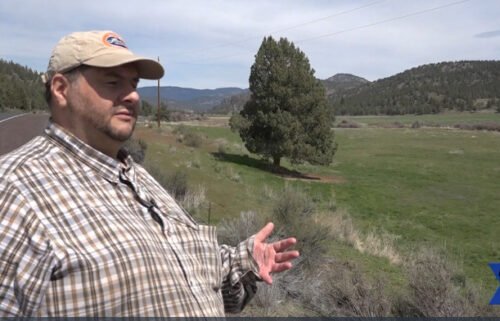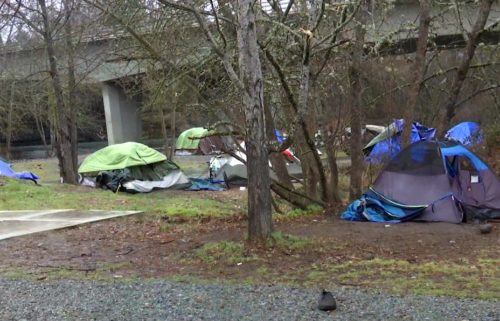‘Legal box,’ not blank slate: Bend councilors start process for regulating unsanctioned camping on city property
(Update: Adding video and comments from meeting)
BEND, Ore. (KTVZ) -- Rarely does any city council tackle a tough issue -- such as, the hot-button issue of homelessness -- without court rulings, state laws and existing policies that come into play. And that's what Bend city councilors were briefed on Wednesday night as they start looking at how to regulate camping on city-owned property.
Associate City Attorney Elizabeth Oshel led the presentation (embedded below) on where the court rulings, state law and related issues stand, as cities across the state and nation grapple with similar issues. She noted that this year's Point-In-Time count tallied 785 unhoused people in Bend, and about 280 shelter beds.
The regulatory “legal box,” as she put it, makes clear that people who experience homelessness cannot be punished for solely not having another place to sleep, and that blanket rules are pretty much out the window – each person’s specific needs and situation has to be taken into account, not just whether a shelter bed is available.
Boise – the city in a much-discussed 9th Circuit federal court ruling – did adopt a fairly sweeping ban on camping on public property. But as Bend Assistant City Attorney Ian Leitheiser noted, even in their code, it requires a police assessment of the individual before anyone can be cited. (The U.S. Supreme Court declined to hear an appeal of the ruling that limited what local governments can do to move the homeless.)
Combined with a new state law that takes effect next July 1 and attempts to codify the Martin v. Boise ruling, the city can set “objectively reasonable” limits on time, place and manner – where, when and how people can camp on city-owned land. But as councilors noted, saying where folks cannot camp begs the question – where can they camp?
Oshel said, “When you get down to it, if we had a regulation to prohibit camping in a certain area, the question would be, does this person have a legally available alternative to sleep?"
Councilor Megan Perkins asked if any Oregon city has had success so far with a camping code, but Oshel made clear that with the new state law approaching, many are just now adopting regulations unique to each city.
“I don’t think we have a model to pick up and apply in Bend and know we won’t be challenged,” she told councilors.
And City Manager Eric King echoed that: “We haven’t had test cases of what works and what doesn’t work.” In fact, the state doesn’t say cities have to enact camping regulations, only laying out some broad requirements if they do.
But if police were to have to inquire about someone’s background and situation before deciding how to enforce such rules, that sounds more like case management to new Councilor Mo Mitchell, who’s a therapist.
“Lots of training and education, basically case management – a lot of resources,” she said. “If we don’t have the resources to enforce the code in a humane way, that’s a stuck spot. It sounds like crisis response, mental health.”
King noted the city is helping Deschutes County fund a crisis response team that can play a role, so it could be a non-law enforcement response, except in some safety situations.
“We can write code, but it’s not good if we don’t work out the details,” such as “the right people to enforce” it, he said.
To avoid a long, drawn-out process, several councilors said they support the city manager forming a working group to review the options and parameters, then return this summer with a proposal or some options. King said a similar presentation will be provided for the public, including a Q&A session.
“To me, the urgency is important,” Mayor Gena Goodman-Campbell said.
Those involved would include the business community, hopefully people who have experienced homelessness, and others such as the Bend Central District, service providers and the like.
Leitheiser said, "We're in that period where there are still a lot of questions about what's going to work and what's going to be legally valid and what's not. What kinds of time, place, and manner restrictions are going to be determined."
For now, Perkins said, “It’s going to be a really rough summer. My concern is the constant displacement of people around the city.” She and others want the focus not just on where people cannot camp, but where they can. Amid a shortage of camping spots for anyone, including visitors, where those who are directed to leave can go is as problematic as ever.
"I personally don't feel comfortable with the when and the where right now, because we don't have any place for them to go. I do feel comfortable talking about the how. I think that's something that's tangible we can hold onto," Perkins said.
Perkins hopes there could be limits such as how many tents in an area, a portable toilet for those who otherwise defecate in front of businesses, etc. “I would hope that solution is part of the discussion, not just don’t don’t don’t don’t don’t.” (Perkins made much the same points in the houselessness update she gives at each council meeting.)
Oshel also noted that the city is not an island or in a vacuum, that “how we regulate impacts areas outside the city limits.” Earlier, Councilor Anthony Broadman expressed strong disappointment that the Forest Service will continue to move people off camping areas south of Bend near China Hat Road “without a place to go,” saying that is “not a humane approach.”
"This situation is going to be less fair for unhoused people and less fair for the housed community as a result of people moving off from China Hat without a plan," Broadman said.
In fact, Perkins said all of those China Hat campers recently received Forest Service notice that they must vacate.
King said staff plan to return to the council at its July 20 meeting with some specifics about the proposed work group and timeline.
Councilors also were expected to approve a long list of changes to its two year budget.
It also includes nearly $2 million to add nine fire-paramedics to keep pace with an increase in calls, and open the new Pilot Butte Fire Station. The budget also includes $300,000 for a crisis response team that would not require a police presence. If approved, the position would be funded for two years through the county's Stabilization Center. It would also need approval from Deschutes county commissioners.
The city plans to spend $200,000 to create a shelter manager position to oversee the city's three shelters, and coordinate among stakeholders.
During council action and reports at the end of the long meeting, Broadman moved and colleagues agreed to have King use his road authority power to restrict or ban camping and overnight parking near established shelters as a temporary policy until councilors consider permanent rules for camping and parking in the right of way.
He said he did so after the Shepherd's House noted the impacts of nearby unregulated camping on the success of their operations, as well as expected pressure on city streets as a result of Forest Service and other agency closures of places people have been camping.
Here's the presentation given Wednesday night:
Megan Perkins' City Council houselessness update:
For tonight’s houselessness update, I want to recap what Council learned about during our work session: creating a municipal code to limit unsanctioned camping in Bend.
Unsanctioned camping is the type of camping we hear a lot of concerns about; unmanaged campsites popping up along City streets and sidewalks.
We learned tonight that there are at least 785 unhoused individuals in Bend and only around 280 shelter beds. This statistic becomes real for many of us when we see our unhoused community members camping in public places all over town. While we continue to increase the number of shelter beds available in Bend, we can start thinking about how we want to regulate camping in public places for the safety of the people who are camping as well as others using public spaces.
While we have 785 unhoused individuals in Bend, it is also important to note that this is a regional crisis with regional repercussions. When we remove a camp on City rights-of-way, some of those campers may move to other public lands in the area. We will continue to see camping on City rights-of-way as other jurisdictions such as ODOT and the Forest Service also regulate and manage their own lands. For example, all campers on China Hat Road recently received notices to vacate, and these types of actions will inevitably move people without houses to new places to camp in the region.
The Bend Municipal Code currently does not ban camping on public property or rights-of-way. We've opened shelters on property owned by the City, and updated our Development Code to hopefully see other property owners develop and open shelters. And now, we will start discussing how to regulate camping on public rights-of-way and other public property in Bend.
In today’s work session, we began the process of developing a camping code by learning that there are limits to what we can regulate, but we do have options for how, when and where camping can be regulated. We have to comply with state and federal laws when we develop a camping code. In some cities, camping codes only deal with camping in public. In other cities, they also address camping in vehicles parked on the street. There is a lot to consider as we develop a camping code that makes sense for Bend.
We gave input on process and the kind of public education and engagement process we’d like to see for this project. Staff will come back to us at a future meeting with recommendations for public engagement. Once we give feedback on a proposal, potentially later this summer, we can get to work developing a camping code that is compassionate and reflects our values.
If you would like to listen to the work session we just completed, you can watch it on the Council agenda page.
As we start working on a camping code we also need to think about how we keep our current shelters, safe parking sites and other facilities that support unhoused community members in Bend safe. We’ve heard from shelter operators and nearby businesses that they are starting to see unhoused community members congregating around these areas when the shelters are closed, and by people who are not engaged in the services the shelter provides. This activity can negatively impact the operations of the shelter sites, and may increase as other places people have been camping are closed. I would like to encourage my fellow Councilors to think of how we might limit camping or congregating around shelters so that we can provide shelter operators the best opportunity for running safe, effective shelter sites, between now and when we consider permanent regulations about camping in the right-of-way. I’m hoping that is something we can address later in our meeting.
This is not easy. We need to come together with our regional partners, our local businesses, and our community to identify safe places for people to go. Our solution can’t just be to tell people where they can’t go but also where they can go. If we don’t continue to work on that piece of this puzzle we won’t be able to make any lasting impact for our houseless and our community at large will not see any decrease in unsanctioned camping. I urge all of our Central Oregon region to help find solutions and security for the houseless not just regulation and punishment.





